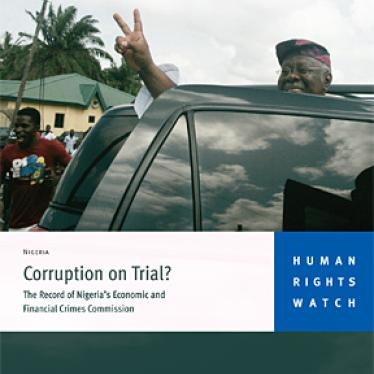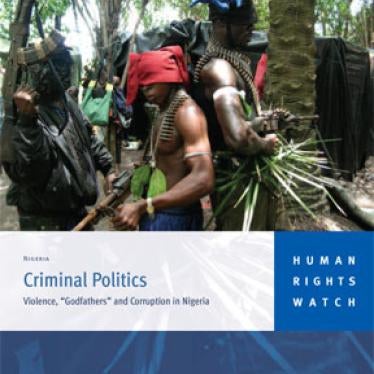(London)– The money laundering conviction and 13-year prison term for the Nigerian politician James Ibori on April 17, 2012, is a landmark in the global fight against corruption, Human Rights Watch said today. Ibori, one of Nigeria’s enduring symbols of criminality and impunity, pleaded guilty in a London court to charges involving more than $79 million.
“The world has just got smaller for government officials who believe they can loot their country’s resources with impunity,” said Daniel Bekele, Africa director at Human Rights Watch. “By prosecuting Ibori, the UK authorities have struck a blow not only against financial crimes at home, but also against impunity for corruption around the globe.”
Ibori, for many years one of Nigeria’s most powerful and wealthy politicians, was governor of Delta State in the oil-rich Niger Delta. During Ibori’s eight years in office, from 1999 to 2007, the state government received several billion dollars in oil revenue, according to financial records published by Nigeria’s Finance Ministry.
Yet there was very little to show in Delta State for all this revenue. The state’s public schools crumbled, while primary health clinics remained dilapidated and lacked basic supplies and medicines, Human Rights Watch said.
A police official who headed Nigeria’s Economic and Financial Crimes Commission (EFCC) tried to bring Ibori to justice in 2007. Ibori allegedly bribed him to drop the investigation. When the official further pursued the case, he was removed from office.
Ibori might have been untouchable in Nigeria, but not in the United Kingdom, where he had laundered some of his stolen money. London’s Metropolitan Police Service secured an order from a London court, in 2007, to freeze $35 million worth of his foreign assets, including a private jet.
Over the next two years, the Metropolitan Police arrested several of Ibori’s associates who lived or traveled within the United Kingdom’s jurisdiction, including Ibori’s wife and sister, as well as his British lawyer and two financial consultants. In 2008, French authorities also arrested one of Ibori’s personal assistants and extradited her to the United Kingdom. Ibori’s six accomplices were charged for their role in laundering the stolen funds. Each was convicted by a London court and sentenced to prison terms ranging from 30 months to 10 years.
In May 2010, Ibori was arrested in the United Arab Emirates on an international warrant obtained by the Metropolitan Police. He was extradited to the United Kingdom in April 2011, and arraigned on 25 counts of money laundering, forgery, and fraud. On February 27, 2012, as his trial was set to begin, Ibori pleaded guilty to seven counts of money laundering, one count of conspiracy to commit forgery, one count of obtaining property by deception, and one count of conspiracy to defraud.
“This case was not just about financial transactions in British banks,” said Bekele. “It was about acknowledging global responsibility for helping to stop the devastating human cost of corruption in Nigeria.”
Across Nigeria, ordinary citizens have seen little benefit from the country’s tremendous oil wealth, Human Rights Watch said. Maternal mortality rates are among the world’s highest, and poverty rates continue to climb. Nearly 100 million Nigerians – some 60 percent of the population – live on less than a dollar a day, according to a recent Nigerian government study.
Public funds that could have been used to improve schools and health facilities have instead been squandered and siphoned off by the country’s ruling elite. Human Rights Watch has documented how in some cases powerful politicians have used the vast wealth at their disposal to arm criminal gangs that fuel political violence.
Despite the EFCC’s efforts in Nigeria to combat endemic government corruption – since 2005, the agency has arraigned 19 former state governors on corruption charges – not a single senior politician or government official in Nigeria is currently serving any prison time for these crimes.
Meanwhile, the United Kingdom continues to provide substantial foreign aid to Nigeria – Africa’s largest oil producer. The Department for International Development announced, in 2011, that it would allocate $1.6 billion in aid to Nigeria over the next four years, more than doubling the amount of annual aid over this period.
Background
In 2007, when Ibori was still governor of Delta State, the EFCC began drawing up corruption charges against him. Before leaving office – and losing his immunity from prosecution – Ibori allegedly attempted to bribe Nuhu Ribadu, who was then the head of the commission, with $15 million in cash to drop the investigation.
Ribadu, a senior police officer, says that he accepted the money, but then deposited it in Nigeria’s Central Bank for safekeeping as evidence. In December 2007, the commission shocked Nigeria’s political establishment by arresting Ibori and charging him with money laundering and abuse of office. The last count in the indictment was the attempted $15 million bribe of a government official.
Many Nigerians had assumed that Ibori was untouchable because he was a close ally of Umaru Yar’Adua, the president at the time, and was widely believed to have financially backed the president’s election campaign. So it came as no surprise to many that two weeks after Ibori’s arrest, Ribadu was removed from office.
Ibori’s corruption case was transferred to a court in the former governor’s home state. In December 2009, a new judge, Marcel Awokulehin, dismissed all 170 counts against Ibori, including the $15 million bribery charge, without hearing any evidence at trial.
Senior Central Bank officials later confirmed to Human Rights Watch that Ribadu had given them the $15 million and that the money remained in their possession.
Ribadu, meanwhile, was subjected to police disciplinary proceedings, demoted, and eventually dismissed from the police force. After Yar’Adua died in office and was replaced by his vice president, Goodluck Jonathan, Ribadu’s rank was restored, his dismissal reversed, and he was retired from the force.
After Yar’Adua fell ill, Ibori’s political fortunes appeared to be on the wane, and he was not seen as close to the new president. In April 2010, the EFCC issued a warrant for Ibori’s arrest, based on new corruption allegations. Ibori, who was still well connected, managed to avoid arrest and fled to Dubai.
“With help from Nigeria’s anti-corruption officials, the cooperation of the Dubai authorities, and the tenacity of London’s police and prosecutors, Ibori has been brought to justice,” Bekele said. “This case demonstrates the urgency of doing more to ensure that Nigeria’s oil wealth goes to help its citizens and not to line the pockets of corrupt politicians.”







